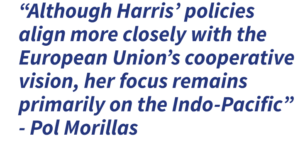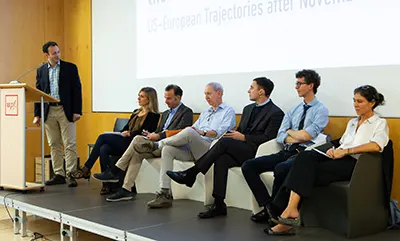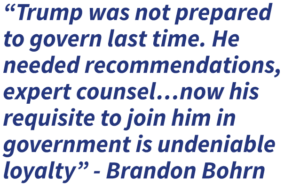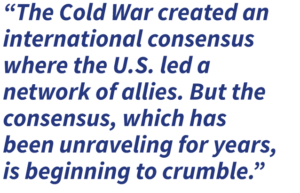Navigating Uncertainty: The Transatlantic Implications of the Upcoming U.S. Presidential Elections
Chronicle of the event “The Day After the Presidential Election: US-European Trajectories after November 5,2024”
On October 29, the Barcelona Institute of International Studies (IBEI) and the Institute of North American Studies (IEN) hosted a roundtable bringing together prominent experts to analyze the repercussions of the U.S. presidential elections on transatlantic relations. The event was moderated by Jeffrey Michaels, the IEN senior researcher in foreign policy and international security at the IBEI with experience at King’s College London and the Changing Character of War Centre at Oxford.
The debate featured renowned figures in international politics, such as Victòria Alsina, political scientist and former Minister of Foreign Action for the Government of Catalonia, she is also a member of the IEN board of trustees. Pol Morillas, director of CIDOB; Brandon Bohrn, a member of the Bertelsmann Foundation’s Europe program; Leonard Hockstader, European affairs columnist at the Washington Post; Jack Thompson, professor of American Studies at the University of Amsterdam; and Carlota G. Encina, researcher at the Elcano Royal Institute specializing in transatlantic relations.
Understanding the American Electoral Landscape
![]()
In the packed Room, Jeffrey Michaels opened the discussion with a stark reminder: this debate is not just about another election cycle, it is about the trajectories that either a Harris or Trump victory could set into motion. For Michaels, a Harris win would mean continuity, a sense of steadiness for Ukraine and a more predictable alignment with Europe. But if Trump were to triumph, his approach, as Michaels pointed out, “could mean a shift to a transactional and unpredictable foreign policy that favors no one.” The stakes are monumental: This is about much more than who’s sitting in the White House; it’s about the global impact.
Victòria Alsina followed with insights about the uniquely American electoral landscape, highlighting the complexities that are often misunderstood by European audiences. “It’s not one election; it’s 51 different ones,” she remarked, focusing on the localized voting laws that make the U.S. electoral map a labyrinth. Alsina pointed out a crucial factor: the swing states, where even a few thousand votes could tip the scales. However, for her, Texas and Florida will be especially pivotal, with recent changes in mail-in voting laws potentially benefitting the Democrats. Yet, she cautioned against oversimplifying the race, as there’s no one-size-fits-all when analyzing American democracy.
Europe’s Vulnerability: The Risk of a Trump Presidency
 Pol Morillas shifted the conversation to how the election can impact transatlantic relations. “Harris represents Biden’s continuation, a Democrat who understands the cooperative dynamics of European values,” he explained, “but don’t expect her to put Europe front and center.” Morillas noted that while Harris’ policies align more closely with the European Union’s cooperative vision, her focus remains primarily on the Indo-Pacific, where competition with China is intensifying. “Trump, on the other hand, doesn’t see allies the way Europe does. His foreign policy is purely transactional” — a friend today could be an adversary tomorrow. And that’s deeply unsettling for Europeans, Morillas concluded.
Pol Morillas shifted the conversation to how the election can impact transatlantic relations. “Harris represents Biden’s continuation, a Democrat who understands the cooperative dynamics of European values,” he explained, “but don’t expect her to put Europe front and center.” Morillas noted that while Harris’ policies align more closely with the European Union’s cooperative vision, her focus remains primarily on the Indo-Pacific, where competition with China is intensifying. “Trump, on the other hand, doesn’t see allies the way Europe does. His foreign policy is purely transactional” — a friend today could be an adversary tomorrow. And that’s deeply unsettling for Europeans, Morillas concluded.

Lee Hockstader turned to the symbolic and real implications of Trump’s second term. “Many Europeans have lost sight of the gravity of January 6,” he said, referring to the storming of the Capitol, “It was nearly a coup d’état, and that speaks volumes about the fragility of democratic institutions today.” He also pointed out that Trump, in a second term, would be motivated, free of the restraints he once faced. “He is uncomfortable with international norms and uninterested in formalities. The Trump doctrine is simple: the U.S. has no equals, specially facing other countries in international forums.” For Europe, this could mean a more aggressive and unilateral U.S. attitude, specially towards China, and one that could threaten NATO unity and further unsettle transatlantic relations.
Brandon Bohrn offered an unsettling assessment of Europe’s reliance on the U.S. and the precarious position it could find itself in, should Trump return to office. “Germany is particularly vulnerable here, as the primary military and economic pillar in Europe. Europe’s dependency on U.S. military expenditure is a grave risk, one that Trump could disrupt.” Bohrn warned that the EU would face mounting pressure to fill the defense gap if U.S. troops began to withdraw. “Under Harris, Europe could expect a certain level of continuity, but with Trump, the dynamics will shift quickly and unpredictably.” “Trump was not prepared to govern last time”, he added, “he needed recommendations, expert counsel…now his requisite to join him in government is undeniable loyalty”.
The Roots of American Nationalism
 As the discussion unfolded, Jack Thompson took a step back to offer historical context on American nationalism. “What many don’t realize is that U.S. nationalism has deep roots; it’s the original American strategy,” he remarked. Tracing a line from the Revolutionary War through World War I, Thompson explained that America’s identity has always been tied to the idea of being unique, better and, most importantly, leaders.
As the discussion unfolded, Jack Thompson took a step back to offer historical context on American nationalism. “What many don’t realize is that U.S. nationalism has deep roots; it’s the original American strategy,” he remarked. Tracing a line from the Revolutionary War through World War I, Thompson explained that America’s identity has always been tied to the idea of being unique, better and, most importantly, leaders.
“The Cold War created an international consensus where the U.S. led a network of allies. But the consensus, which has been unraveling for years, is beginning to crumble.” Thompson argued that both candidates reflect aspects of this legacy: Harris, as a multilateralist, would continue Biden’s alliances-driven approach, while Trump’s nationalism would deepen, aggressively pivoting towards China and reducing the U.S. role in Europe.
What Lies Ahead for U.S.-EU Relations

Carlota Encina rounded off the panel with a practical look at the potential scenarios: “We’re looking at four possible outcomes: a big win for Harris, a narrow win for Harris, a big win for Trump, or a narrow win for Trump. But realistically, a big win for Trump isn’t likely.” “The U.S.-EU relations are based on three pillars: the relations between European Union and Washington, NATO and Washington and the bilateral connections between each European country and U.S. If Kamala wins, the first two will be reinforced, while a Trump victory would mean a focus on the last”, added Encina emphasizing the concerning challenges a Trump victory would bring. “His foreign policy is purely transactional, but there could be a silver lining: Europe might finally be forced to strengthen its autonomy and reduce its dependency on U.S. support.”
Particularly, she advised that Spain must reinforce its strategic bilateral ties, which include U.S. military bases, economic investments, and shared interests in energy and security, to enhance its role in international defense. With NATO’s importance rising, Spain’s commitment to reaching a 2% investment in military spending by 2029 reflects its dedication to collective security. However, Spain should really focus on strengthening its bilateral relationships to ensure a more active and influential presence in global affairs.
Should Europe prepare for a future Beyond U.S. Support?

The audience raised questions that reflected the panelists’ concerns, especially regarding the EU’s position in the changing global landscape. “Are we just waiting for the U.S. to lead everyone?” one attendee asked. Jack Thompson answered candidly, “Europe is often the junior partner, historically speaking. The U.S. will always have more influence, development, and military weight.”
The U.S. is adapting faster to a multipolar world, while the EU is still deliberating. Brandon Bohrn expanded on this, pointing to the need for Europe to recalibrate its defense priorities: “It’s not just about spending more but spending smartly; knowing where to allocate resources and build resilience, something the Ukraine crisis has brought to attention for the EU.”
Pol Morillas added depth to the discussion, pointing out that Europe’s options were far from simply binary.: “There are many ways to approach defense, and no single solution applies to all. We must remember that defense is not just about military strength, it’s also about maintaining strong alliances and effective diplomacy.”
Victoria Alsina shared her views on Europe’s limitations in shaping its own international policy, pointing a lack of political will and resources. “Europe wants to act autonomously but often lacks the means or consensus to do so,” she observed. The panelists agreed that while a Harris presidency might provide some relief in terms of cooperation, Trump’s potential return would demand Europe to redefine its strategy and possibly accelerate plans for strategic autonomy.
The panel closed with Carlota Encina’s reminder of the unique challenges in U.S.-Europe relations, no matter who takes office. The implications for Israel, Ukraine, and China, as well as economic and tech policies, would be significant either way, but Europe’s role as an independent actor is still uncertain.
The truth is that Europe must look beyond the next U.S. election and start preparing for a future where American support is not guaranteed. No matter the outcome on November 5, the transatlantic relationship, a cornerstone of Western stability for decades, is at a pivotal crossroads.